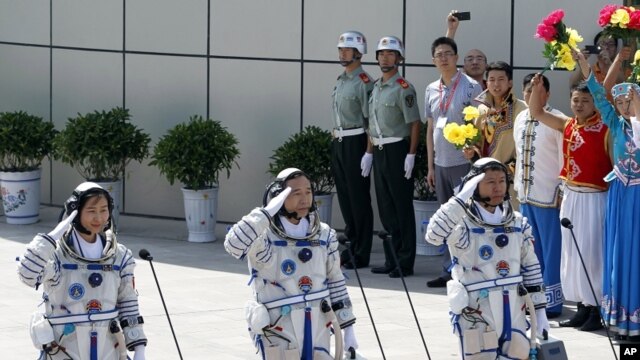
China's astronauts from left Liu Yang, Jing Haipeng and Liu Wang salute before they depart for the Shenzhou 9 spacecraft rocket launch pad at the Jiuquan Satellite Launch Center in Jiuquan, China, Saturday, June 16, 2012.
BEIJING - China successfully launched its first woman astronaut into orbit on a mission that marks an important step in the country's plans to build a permanent space station.
The Shenzhou 9 spacecraft blasted into space Saturday under clear skies at the Jiuquan Satellite Launch Center in western Gansu province.
The spacecraft carries a crew of three astronauts, including China's first female in space, Liu Yang. The Shenzhou 9 is set to dock with another spacecraft, Tiangong 1, which is in orbit more than 300 kilometers above Earth.
One of the Chinese government's highest-ranking female officials, State Councilor Liu Yandong, read a letter of congratulations from Chinese President Hu Jintao, who is on a visit to Denmark. Speaking through an interpreter, she said Hu sees the docking mission as a “big milestone” for China.
“I'd like all of you to continue your spirit of hard work and achieve complete success in our first manned space docking mission, and to create new achievements for our manned space program,” said Liu.
China's top legislator, Wu Bangguo, presided over a mission send-off ceremony, and was shown on television monitoring events from the control room.
During the launch video monitors showed live images of the three-person crew, which appeared to be calm while reading handbooks.
Astronaut Liu Wang will be mainly in charge of a manual docking of the Shenzhou-9 with the Tiangong-1, a task that will be performed in coming days. Speaking Friday, he said this will be very difficult.
He said the manual rendezvous requires a lot of technology and skills, so he has rehearsed the maneuver more than 1,500 times.
Mission commander Jing Haipeng said he is still excited even though this is his third time in space.
He added that with China's growing space industry, he expects that in the future, there will be many more astronauts who will make multiple missions.
The crew is expected to spend 13 days in space, conducting scientific, medical and technological experiments. |
|
